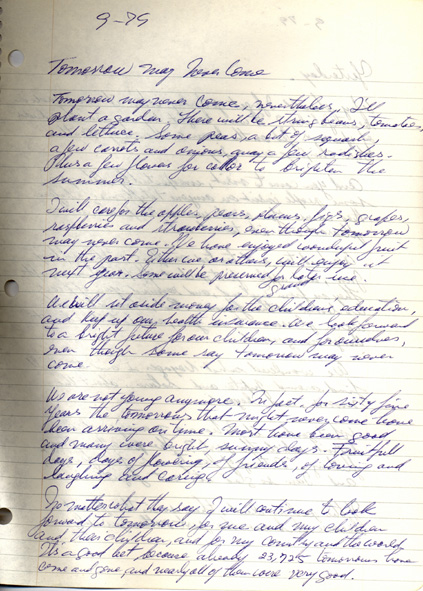
|
My friend Esiquio Narro
|
| An advantage of living in a big city is the large number of
potential friends. Good friends are dear. I would like to introduce you to one
of mine. Esiquio Narro and I first spoke in August 1979 at the
arboretum. Esiquio was there, and gently scolded me, my sister and her friend
Hanna for picking apples to make pies. Later on Esiquio and I became
friends. He has been retired since 1976, but has kept active volunteering to
raise plants, do grafting, teach classes about gardening and pruning,
offer advice, tell stories, and show people his remarkable garden. At its
prime his garden was home to more different kinds of plants in a small
amount of space than any other place known to me. It was like a garden of
Eden, luxuriant with flowers, fruit and trees. |
| Esiquio is not only a superb gardener and master storyteller, he is a
wise and generous man. Until this year I didn't know he was also a
prolific writer. This winter he loaned me one of his three dozen journal
volumes, and it just happened to be the August-September 1979 one. Here is
one of Esiquio's entries, written on his 65th birthday. I hope you like it
as much as I did. |
| "Tomorrow may never come. Nevertheless I'll plant a garden.
There will be string beans, tomatoes, and lettuce. Some peas, a bit of sqush, a
few carrots, onions, and radishes. Plus a few flowers for color to brighten
the summer. |
| I will care for the apples, pears, plums, figs, grapes, raspberries
and strawberries, even though tomorrow may never come. We have
enjoyed wonderful fruit in the past. Either we or others will enjoy it next
year. Some will be preserved for later use. |
| We will set aside money for the grandchildren's education, and keep
up our health insurance. We look forward to a bright future for our
children, and for ourselves, even though some say tomorrow may never come. |
| We are not young anymore. In fact, for sixty five years the
tomorrows that might never come have been arriving on time. Most have been
good and many were bright, sunny days. Fruitful days, days of flowering,
of friends, of loving and laughing and caring. |
So no matter what they say I will continue to look forward
to tomorrow, for me and my children and their children, and for
my country and the world. It's a good bet, because already 23,725
tomorrows have come and gone, and nearly all of them were very good."
|
(originally written for, but not published in, The Seattle Weekly, April 1997. Esiquio died April 16, 1999 at age 85.)
Back |
|
|

